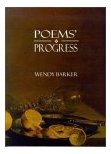|
Contents » Cover |
||
|
Reviews
Here it is, the great temptation realized. Wendy Barker has done what part of me wants to do with every poem I write: chaperone it personally into the world, an eager stage mother, to make sure the reader gets it, understands the richness of reference, the surprises from the subconscious. Barker, who teaches at the University of Texas, San Antonio, and has published three collections of poetry—Winter Chickens, Let the Ice Speak, and Way of Whiteness—has chosen 21 of her poems, written over nearly a quarter-century, and laid them out in this provoking book as portals into her poetic process. First we have the finished poem, followed by one, two, or, most rewardingly, a succession of facsimile drafts, marked up accordingly as her focus sharpens and compresses. This is all good and useful stuff, to see The Process as others pursue it. And her poems are very satisfying. They invite us all the way in to a wry and watchful mind, lead us around mental corners into surprising spaces. After each poem with its successive drafts there is a section called "About the Writing." This is a sort of explication du texte, a meditation on the cross-currents of emotion and event out of which the poem grew. Using the poem's referents as points of departure, she carries us way beyond into rich, ruminative autobiographical musings. In her animated, wide-ranging narrative, you can positively feel the imagination's release from the rigor of poetry into the freedom of multiple modifiers and digressions. There is so much to tell! As in the poem Baptism:
Light dim as the crumbled leather This is just right. I am there, and the poem has given me all I need. I smile and savor and remember. In the essay that follows, though, there is much, much more:
I can smell my granny's citrus scent above and beside me, her 4711 cologne. Not the Chanel No. 5 or Arpege of my four-foot-ten-inch American grandmother, swaddled in furs and sparkling with brooches. Granny was sensible, with the clearest skin I have ever seen, pink-cheeked, and as focused as Grandma was vague. Grandma was cuddly and sweet, a cream-centered chocolate; Granny was determined and directive, a Vick's cough drop. If Grandma incessantly kvelled, Granny kvetched. Both would have been horrified at their granddaughter's use of Yiddishisms . . . This guided tour through the lumber yard of poetic manufactory, however engaging, is, I find, an odd and unsettling experience. Compression is implicit in the mechanics of poetry, it seems to me. All these elements of imagery, event, sentiment, memory, object, relationship—surely it's the pressure of their combustion under constraint, their containment in the firebox, that drives poetry, that is "the force that through the green fuse drives the flower." When a poem is unpacked with such abandon, even with Barker's deft humor and sharp eye, it is is peculiarly queasy-making, like an autopsy. As Wordsworth says, "Our meddling intellect / Misshapes the beauteous forms of things / We murder to dissect."
|
|||||
